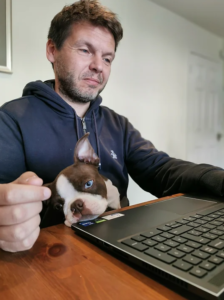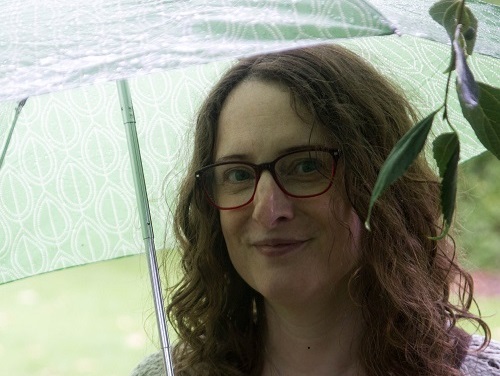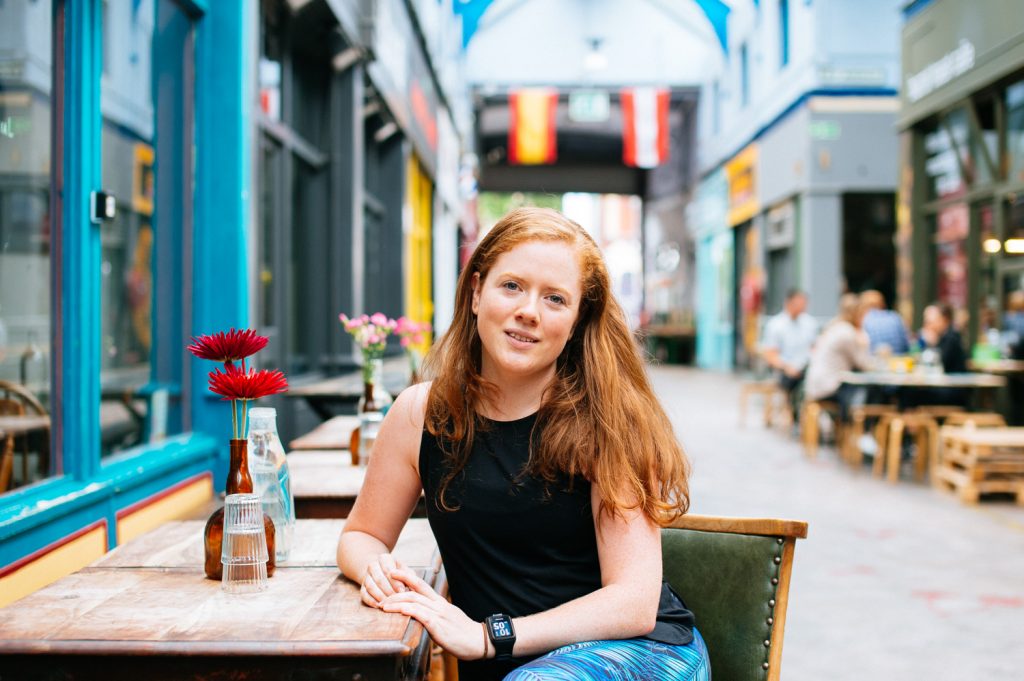Fabien Littel did an MSc in Organisational Psychology at Birkbeck. Here, in a blog post that originally appeared on his personal site in October, he talks about his experience studying whilst in his forties.
It’s only been two weeks since I handed in my dissertation, the final step in completing my MSc in Organisational Psychology, at the end of a life-changing 2-year adventure. It’s only been two weeks, and it will be another good few weeks before I get my final results and know if I’ve been awarded the Masters. Still, I already know just how much I have learned and how I developed a new perspective on work, and life in general, which no grade won’t take away. I have often used the term “life-changing” to refer to this experience, very mindful of how cliché and over-hyped it may come across. It is however merely a fact: through these studies, my life has changed. I am now embarking on an academic path I would have only dreamt of a few years ago, and most importantly have developed the courage and confidence to understand, accept and express my individual beliefs and views on the world around me, and to move away from the comfort and convenience of general blind acceptance.
From jigsaw puzzles to research journals
Looking back at September 2020, why did I suddenly decide to get back to university? My light-hearted answer to this question is usually that, during the first few months of covid-19 lockdowns, I had developed a dangerous addiction to jigsaw puzzles, and needed to find something else to occupy my free time. This was only partly a joke; I had genuinely built a large collection of jigsaw puzzles, was on them before, after – and sometimes during – work

(I’d argue that it helped me focus my mind…), and they frequently invited themselves in my dreams too. Aside from that, I was increasingly interested in what motivates people to work, what makes them feel good about their job, and what might they feel more conflicted about. The pandemic played a part in this too, as companies had to take responsibility for their employees in a way they never had before, and many employees had opportunities to contribute, in one way or another, to the response to this crisis, and gain a new sense of purpose in the work they were doing. I started reading on the topic, and gradually felt that I wanted to develop some more in-depth foundational knowledge to shape my own thinking. From there on, it became a relatively quick process, and probably just a matter of days until I enrolled onto my MSc. Organisational Psychology quickly appeared like the most appropriate choice for my area of interest, and to build on my first Masters in HR by approaching work from a different angle. And the choice of university was quite straightforward too, once I had narrowed down the options for part time online learning. Birkbeck, which I ended up joining, stood out with its mission of supporting lifelong learning, designing classes for people who study alongside work, and for its longstanding expertise in organisational psychology – a choice I never regretted, quite the opposite.
Learning about yourself while learning about others
The nature of the course and what we were studying meant that it enabled us not only to learn about careers and organisational behaviours of others, but also to reflect on our own. And this started quite early on, as we looked at career development, or employee motivation. A large part of the learning was about reading required lists of weekly research journals and additional material in support of essays and other work. And we weren’t short of additional recommendations from lecturers.

One of the first ones I took up was to read Herminia Ibarra’s book Working Identity. It provides a perspective on the sense of identity attached to people’s careers, and importantly how a change of direction and transition in one’s career can help reinvent this identity, or how Ibarra calls it, “becoming yourself”. She describes a process consisting of experimentations and sensemaking to define your new self, and a long process of transition made up of small steps, taking place through the course of several years. The book is illustrated with examples which bring to life these experiments, and steps people have taken to lay the foundations of a new career, and indeed reinvent themselves. It was a fascinating read, which I did just as I was beginning to envisage what a different second half of my career might look like, therefore couldn’t help seeing it both as a complement to the course, and a self-development book for myself. From that perspective, it made a great difference to read it when I did; while I was at first concerned about this perspective on career transition as taking years, requiring deep-level self-reflection and experimentation (especially when feeling a certain sense of urgency for change), it helped me take a more measured and long term view on a process which I am still only just probably half way through, and helped me come to terms with the fact that you shouldn’t just expect to wake up one day with a clear view of where your career, and life more broadly, should go, but that it requires time and effort.
“Resistance is fertile”
From the very start of the MSc, we were told that one the main skills we should develop was our critical thinking, and that we needed to find our voice. At first, this might have seemed like a contradiction as we were also told to base our writing and arguments on existing research and scholar literature – so how can we be critical, and find our own voice, if we can only repeat what has been said before? It turns out we were vastly underestimating the spectrum of ideas and perspectives already out there, and still learning the art of taking existing views, organising them and building on them in a way that becomes deeply personal to you (an art I am still working on…). The most energising and stimulating side of the reading we were doing was to read papers with opposing views and paradigms, particularly those highlighting the shortcomings and challenges with what had been seen and applied as most mainstream theories for decades. This came through particularly in a couple of modules, including one looking at selection and assessment, led by an inspiring lecturer who was committed to providing insights on not only the widely accepted theories and processes, but also the challenges of racism and social injustice which came with them, including issues such as racial bias in cognitive ability testing, and perpetuation of social inequalities via practices mostly developed through the lens of white western men.

Her teaching took inspiration from Paulo Freire’s Pedagogy of the Oppressed, particularly in rejecting the “banking” view of education, whereby someone in position of power imparts the knowledge they are the custodian of, to others in a position of inferiority who are expected to receive and accumulate this knowledge. Instead, it advocates for co-creation of knowledge, which is something we experienced through this teaching. Of course, some concepts and ideas were presented and shared with us, however through discussions opened up by the lecturer, there was a clear acknowledgement and respect of everybody’s individual experiences, and how much these experiences contributed towards everyone’s learning, and provided much richer perspectives.
I was fortunate to also get the opportunity to join this lecturer, together with a couple of other students, in a collective writing project, which I hope to share more about in due course, and was for us an amazing way to bring co-creation to life, and constructively share and bring together our lived experiences and beliefs, in an environment of solidarity and support.
Becoming a truer version of myself
University, and studying in general, is a time for exploring, exchanging, and experimenting with ideas, developing your own thoughts and beliefs, your hopes for the world. Too often, for young people, this risks getting quashed when confronted with the reality of the corporate world. One of the benefits of experiencing this after twenty or so years working, observing the dynamics of corporations, getting satisfaction from achieving things and bearing the scars of burnout, is that it enables you to pause and revisit those twenty years with a little bit of distance, and some new perspectives. What it did for me, was to bring out views on the world of work, and systemic injustice or harmful phenomena, as well as hope for meaningful and fundamental change, which I would have briefly thought about and kept well hidden in the past. It gave me permission to think these ideas through, resist the sense of inevitability I had felt up until that point. Learning, reading and discussing new concepts such as neoliberalism, social constructionism, social Darwinism, moral disengagement, and many more, which wouldn’t have meant much two years ago, put names on what had only been until then passing thoughts, and opened up the door for even greater exploration, and knowledge that not only did others share similar thoughts, some had actually spent much of their careers defining and studying them.
Practically, unearthing and embracing these views throughout the MSc, together with conducting my research project on matters related to moral reasoning at work, contributed to me questioning in more depth my own contribution to the world through my work. This led to my decision to leave the defence industry (which I have talked about in an earlier article), and to find a way to continue on this academic path. “Following your dreams / passions” is an easy piece of advice often given, however remains a very privileged thing to do, when the reality of daily life and cost of living hits, and prevents many from exploring a path of their choosing. And so I do feel privileged that I was able to find arrangements I could put in place to enable me to follow this path further through starting a full-time PhD.
I am only a couple of weeks into my PhD with the University of Southampton, grateful, energised and excited about what the next three years will enable me to learn and do. And I remain very mindful that I wouldn’t have reached this point if it hadn’t been for the opportunity to conduct part-time studies online while working. Both the practicality of what Birkbeck had to offer, and the commitment and dedication of its staff to deliver a truly transformative learning experience, despite some of the challenges they may have faced in trying to safeguard this level of quality and acceptable conditions for themselves, is to be applauded. At times when careers are stretching longer and many people will look to transition part-way, enabling access to higher education to the working population should be seen for the powerful and genuinely life-changing impact it can have.
More information:
- Study MSc Organisational Psychology at Birkbeck
- Read more of Fabien’s posts on his personal site





